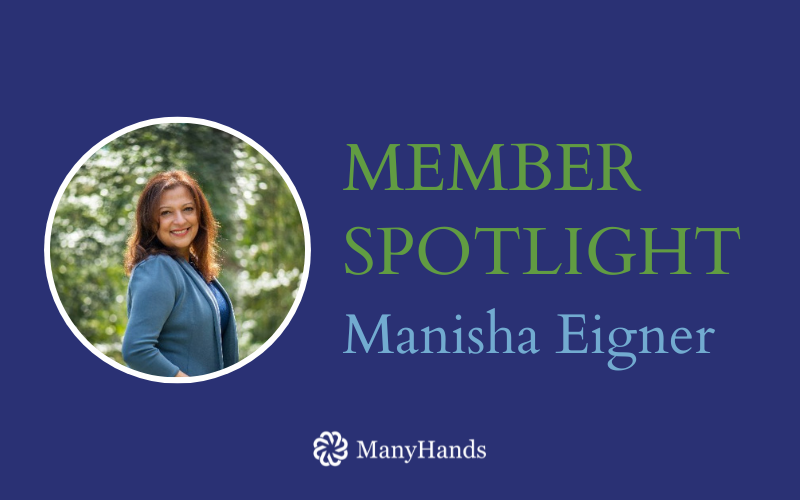Manisha Eigner has been a Many Hands member since 2020. She has served twice on the Housing Committee and once on Health. After working in the pharmaceutical industry and biotechnology for more than 15 years, Manisha channeled her entrepreneurial energy into cofounding Clear Skies Meadery, together with award-winning meadmaker Yancy Bodenstein. She serves as CEO of the Rockville-based brewery, which sells a large range of honey-based wines in its own taproom, as well as local markets.
What initially inspired you to join Many Hands?
When I first heard about Many Hands, what I found most appealing was the four focus areas. The work of some charities can seem very broad, and I really appreciate the fact that Many Hands focuses on economic empowerment, education, health, and housing for the economically disadvantaged.
Is there a focus area that is particularly important to you?
I started off on the Health Committee because of my background in pharmaceuticals and biotech. Then the following year, I decided to move on to Housing. Housing has really resonated with me, partly because I come from India and the poverty there is very visual. People live in shanty towns or don’t have any housing; you see a lot of people living on the street.
If you don’t have housing, you don’t have a base. If you don’t have a roof over your head, there’s nowhere to store your food, prepare your meals, put your clothes. You don’t have a place; you’re just a nomad. You need to jump off from somewhere, and you can’t do that if you’re living out in the streets.
I think housing is a basic necessity. With the resources we have in the modern world, every human being should be entitled to housing. It should be a given that as a society we need to provide housing for people who don’t have the resources or the capacity to provide it for themselves.
How has your background in business, and as an entrepreneur, shaped the way you approach grantmaking?
Coming straight from biotech, I would have looked at the grantmaking process as a project with checklists to complete. Being an entrepreneur has really changed the scale of my thinking. It’s not just about checking a list of requirements. You’re focusing on the broader vision of the organization: what they’re trying to achieve with the grant money, how it relates to their cause, and how their cause relates to the mission of Many Hands. You’re also thinking about how a grant will affect them not just today but in coming years, how they’re building a foundation for the future. Anyone can start a business, but how you’re going to sustain it—that’s something an entrepreneur has to think about every day. It’s the same for a charity, especially since needs have grown exponentially since the beginning of the pandemic and resources have not expanded at the same rate.
What have you learned through your participation in Many Hands?
One of the biggest eye openers for me has been the amount of need in the DMV area, where the average income of families is around $100,000 plus. There is profound need hiding behind the wealthy, upper middle class, and middle class population that thrives in this area. Housing in the DMV is so expensive. Where do we expect people to live? How do we expect people to have access to good health care and education without housing?
Reading through the 20-30 grant applications we review each year has been sobering, but it has also helped convince me that I want to continue working with Many Hands as long as I can. I love the fact that everything we do is volunteer-based. We do not have corporate officers who are getting a million dollar paycheck. The money comes in and goes out, besides what covers certain administrative costs. I feel we make a 100% impact on the need in this area.
And my self-education through Many Hands has been immense. It has really helped me think about what kinds of charities I donate to, what I value, what I empathize with—more than I ever did before. It has been a wonderful journey of self-exploration.
—Interview with Mary Kwak


